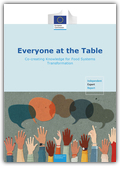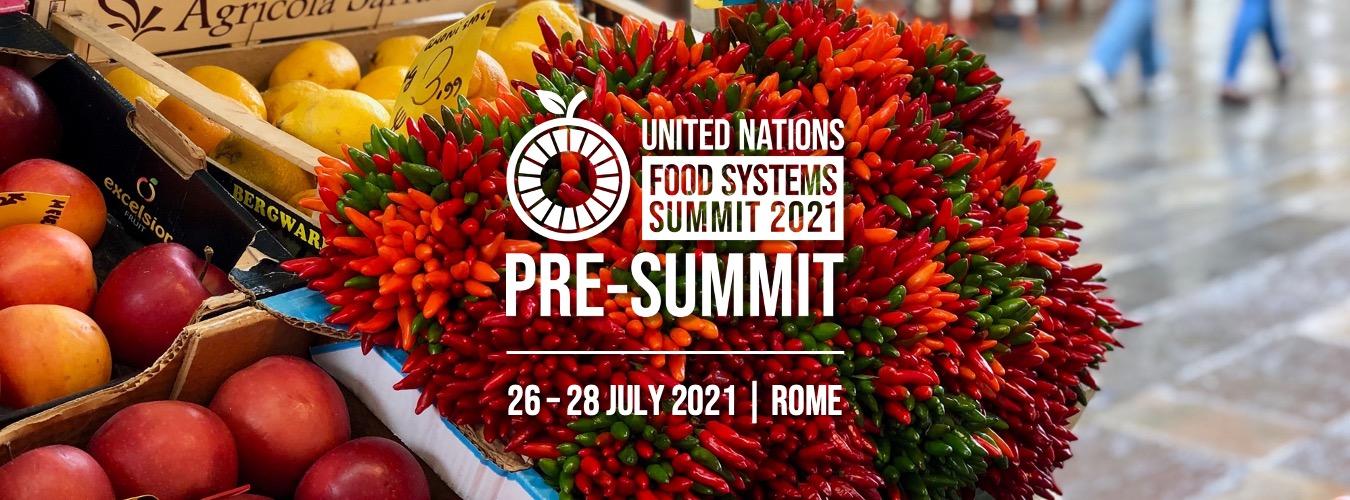The European Commission was involved in following main sessions:
26/07 Panel Discussion 1 – How Can We Make 2021 the Start of a 'Decade of Action' for Food, Climate and Biodiversity Goals?
- Mr. Nigel Topping, High Level Champion for Climate Change at COP26 and Race to Zero
- Ms. Elizabeth Mrema, Executive Secretary, Convention on Biological Diversity
- H.E. Janusz Wojciechowski, Commissioner for Agriculture, European Commission
- H.E. Lord Zac Goldsmith, Minister for Pacific and the Environment at the Foreign, Commonwealth and Development Office (FCDO) and the Department for Environment, Food and Rural Affairs (Defra), United Kingdom
- Mr. Sun Tan, Vice President of the Chinese Academy of Agricultural Sciences
- Dr. Andrew Steer, President and CEO, The Bezos Earth Fund Ms. Florence Jeantet, Managing Director, One Planet Business for Biodiversity (OP2B)
28/07 Synthesis plenary
- H.E. Janusz Wojciechowski, Commissioner for Agriculture, European Commission
The European Commission was involved in affiliated sessions
Affiliated sessions bought out additional valuable ideas and offering a platform to convene actors around the world to ensure more voices and ideas are heard, and more actors are thinking about how to take action in their own contexts.
27/07 Everyone at the table: Co-creating knowledge for food systems transformation.
Session by University of Montpellier and European Commission
 This is the link to the latest EC High Level Expert Group’s report:
This is the link to the latest EC High Level Expert Group’s report: - This mid-term report presents the early findings of the Expert Group exploring ways to strengthen the international science policy interface (SPI) for improved food systems governance.
- The experts have analysed a number of existing science policy interfaces and conclude that, while a number of them work very well, an additional framework linking local, national, regional and international levels as well as different facets of the food sector, will be required.
- The Expert Group will draw on the outcome of the Pre-Summit meeting in July and the UN Food Systems Summit to elaborate a more detailed proposal on this additional framework during the second phase of their work, due for completion in the first half of 2022.
Panel - Moderator: Evan Fraser, professor of Geography at the University of Guelph
- Peter Wehrheim - Head of Unit for Food Systems and Bioeconomy · European Commission, DG Research & Innovation - introduction. He announced the Farm to Fork conference of 14-15 October 2021 related to the World Food Day 16th of October
How science can inform policy and dialogue at municipal, national and regional level- Barbara Swartzenruber - Executive director Smart Cities, City of Guelph
- Thembi Mwamakamba - porgram manager FANRPAN
- Ismahane Elouafi, FAO chief scientist - the role of science to inform food systems policy
- Gerda Verburg - UN Asistant Secretary-general, Coordinator of the SUN movement
- Patrick Caron - HLEG member, France - concluding remarks
- Arnold, Tom - Ireland, Chair HLEG -
High Level Expert Group (HLEG) members:
- This mid-term report presents the early findings of the Expert Group exploring ways to strengthen the international science policy interface (SPI) for improved food systems governance.
- The experts have analysed a number of existing science policy interfaces and conclude that, while a number of them work very well, an additional framework linking local, national, regional and international levels as well as different facets of the food sector, will be required.
- The Expert Group will draw on the outcome of the Pre-Summit meeting in July and the UN Food Systems Summit to elaborate a more detailed proposal on this additional framework during the second phase of their work, due for completion in the first half of 2022.
Panel
- Moderator: Evan Fraser, professor of Geography at the University of Guelph
- Peter Wehrheim - Head of Unit for Food Systems and Bioeconomy · European Commission, DG Research & Innovation - introduction. He announced the Farm to Fork conference of 14-15 October 2021 related to the World Food Day 16th of October
- Barbara Swartzenruber - Executive director Smart Cities, City of Guelph
- Thembi Mwamakamba - porgram manager FANRPAN
- Ismahane Elouafi, FAO chief scientist - the role of science to inform food systems policy
- Gerda Verburg - UN Asistant Secretary-general, Coordinator of the SUN movement
- Patrick Caron - HLEG member, France - concluding remarks
- Arnold, Tom - Ireland, Chair HLEG -
Arnold, Tom - Ireland, Chair / Sonnino, Roberta - Italy, Rapporteur / Webb, Patrick – United Kingdom, Vice Chair / Biermayr-Jenzano, Patricia - Argentina / Broerse, Jacqueline - Netherlands / Brunori, Gianluca - Italy / Caron, Patrick - France / De Schutter, Olivier - Belgium / Fan, Shenggen - China / Fanzo, Jessica - USA / Fraser, Evan - Canada / Gurinovic, Mirjana - Serbia / McGlade, Jacqueline - United Kingdom / Nellemann, Christine - Denmark / Njuki, Jemimah - Kenya / Singh, Brajesh Kumar - Australia / Tuomisto, Hanna - Finland / Tutundjian, Seta - Bulgaria / Wesseler, Justus – Germany
27/07 Nutrition for growth and cohesion - how next generation school feeding programmes can support carbon farming and sustainable food system transformation.
- By FAO and European Commission
- Related: 28 July 2021. SCHOOL MEALS COALITION
The emerging School Meals Coalition organized a Ministerial session focused on school meals programs as drivers of food system transformation, while simultaneously improving education systems, child health and nutrition. Programs that provide nutritious food and are linked to local purchase and other health services, can transform local agriculture, increase resilience and sustainability. Scaling up these integrated programs will support pandemic recovery and serve as a powerful tool to accelerate action on the SDGs. Leading Ministers and partners discussed how build and contribute to this new collaboration before its official launch in fall 2021.
- Moderator Ms. Carmen Burbano, Director School-based Programmes, WFP
- Ms. Valerie Guarnieri, Assistant Executive Director, WFP
- H.E. Ville Skinnari, Minister for Development Cooperation and Foreign Trade, Finland
- Video on School Meals Coalition
28/07 Deep Dives into the Nexus of Food Systems, Climate Change and Nutrition in Malawi, Ethiopia and Nigeria.
- By IFPRI, IISD, BMZ, GIZ, European Union (EU), Nigeria, Malawi
- This session explained how we can influence consumption patterns through policy interventions that will lead to better environmental and nutritional outcomes in three countries—Malawi, Ethiopia, and Nigeria—in order to identify policy roadmaps to sustainable food system transformation. Specifically, by building on the Ceres2030 literature review and cost modelling exercise, this research supports analytical work to strengthen the evidence base for climate-smart nutrition interventions in the context of a sustainable food system. This aligns with the overarching transformative theme of the UN Food Systems Summit.
- The purpose of this parallel session was to present the results from the country case studies, together with country focal points from the three countries: the Office of the Vice President of Nigeria, the Ministry of Public Health in Malawi, and the Federal Ministry of Health in Ethiopia. We aim to develop joint ownership of the final recommendations and enhance the utilization of the research in the Food Systems Summit, dialogues, and long-term country-level strategies.
- Deep Dives Into the Nexus of Food Systems, Climate Change, and Nutrition in Malawi, Ethiopia, and Nigeria provided examples of how to develop a country-level roadmap for food systems transformation that could serve as a blueprint for other countries and that is based on the best available evidence, economic modelling, and a deep engagement with national-level stakeholders working together with experts.
Speakers:
- Francine Picard, Senior Policy Advisor and Partnerships Lead, IISD
- Carin Smaller, Director of Agriculture, Trade and Investment, IISD
- Dr. Andrew Kwasari, Senior Special Assistant to the President on Agriculture, Office of the Vice President of Nigeria
- Christel Weller-Molongua, Director of Rural Development and Agriculture Division in the Global Department at GIZ
- Dr. Felix Phiri, Department of Nutrition, HIV and AIDS of the Ministry of Health in Malawi
- Willem Olthof, Deputy Head of Unit, DEVCO C1 - Rural Development, Food Security, Nutrition, European Commission
27/07 The EU Code of conduct on responsible food business and marketing practices
Collective engagement of food business operators, manufacturers, retailers and foodservice/hospitality sector in the transformation towards sustainable food systems: the example of the EU Code of conduct on responsible food business and marketing practices.- By Food Drink Europe, European Commission
- No recording available
- Related: 5 July 2021. High-level launch event on the Code of Conduct for Responsible Food Business and Marketing Practices
The European Commission has launched a Code of Conduct for responsible food business and marketing, with the aim of ‘improving the health of our citizens, our societies and the planet’.
On the occasion of the launch, a high level stakeholder event was being organised with a keynote address from the Commissioner for Health and Food Stella Kyriakides, as well as video messages from the Executive Vice President Frans Timmermans and Commissioner for Internal Market, Thierry Breton. The Code was presented by Dirk Jacobs, the Chair of the Task Force that developed the the Code of Conduct. This Code is an essential part of the efforts to increase the availability and affordability of healthy, sustainable food options that help reduce our overall environmental footprint. It has been developed with EU associations and companies, as well as international organisations, NGOs, trade unions and trade associations. Associations and companies in the food sector that sign the Code voluntarily commit to accelerate their contribution to a sustainable transition.
On the day of the launch of the Code, 65 signatories (26 food manufacturers, 15 food retailers, 1 from the food service sector, 23 associations) became the first pioneering companies and associations
On the day of the launch of the Code, 65 signatories (26 food manufacturers, 15 food retailers, 1 from the food service sector, 23 associations) became the first pioneering companies and associations


No comments:
Post a Comment